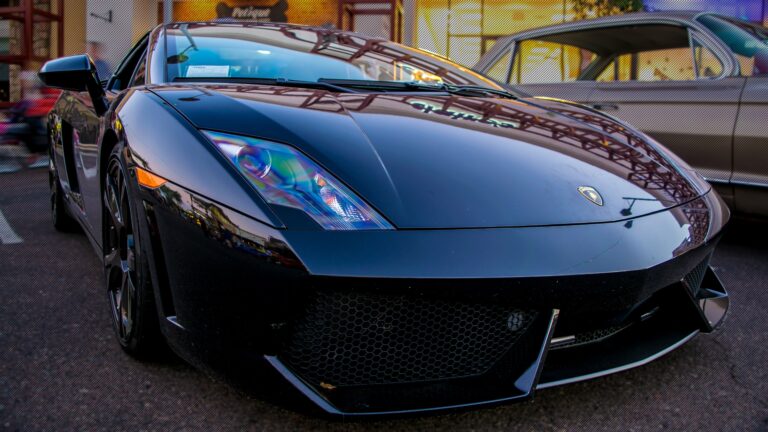Car Brands In Egypt: Navigating the Dynamic Automotive Landscape
Car Brands In Egypt: Navigating the Dynamic Automotive Landscape cars.truckstrend.com
The automotive market in Egypt is a vibrant and ever-evolving ecosystem, reflecting the country’s unique economic conditions, consumer preferences, and strategic geographical position. Far from being a monolithic entity, it is a mosaic of international and local players, each vying for a share of a market driven by a population that values mobility, affordability, and reliability. Understanding the landscape of car brands in Egypt is crucial for consumers, investors, and industry observers alike, offering insights into purchasing trends, economic indicators, and the direction of the region’s automotive future.
This comprehensive guide will delve into the diverse array of car brands present in Egypt, exploring the factors that shape their popularity, the challenges they face, and the opportunities that lie ahead. From established global giants to rapidly emerging contenders, we will navigate the nuances of this dynamic market.
Car Brands In Egypt: Navigating the Dynamic Automotive Landscape
The Evolving Landscape of the Egyptian Automotive Market
Egypt’s automotive sector has undergone significant transformations over the decades. Historically, local assembly played a pivotal role, with companies like General Motors Egypt and Bavarian Auto Group (BMW’s assembler) contributing significantly to the market. However, trade agreements, particularly the EU-Egypt Association Agreement, which phased out customs duties on European cars, dramatically shifted the balance towards imported vehicles. More recently, government initiatives to promote local manufacturing and the burgeoning interest in electric vehicles (EVs) are once again reshaping the market.
Consumer preferences in Egypt are largely driven by practical considerations. Affordability, fuel efficiency, and a strong resale value are paramount. Reliability and the availability of spare parts and after-sales service also weigh heavily on purchasing decisions, given the often challenging road conditions and the importance of long-term ownership costs.
Dominant Players: A Deep Dive into Key Brands
The Egyptian car market is characterized by a healthy mix of brands from various global origins, each catering to different segments and consumer needs.
Japanese Giants: The Epitome of Reliability
Brands like Toyota, Nissan, Mitsubishi, and Suzuki have long held a strong foothold in Egypt. Toyota, with its legendary reliability and high resale value, remains a top choice, especially for models like the Corolla and Fortuner. Nissan’s Sunny and Qashqai are ubiquitous, known for their practicality and robust build. Mitsubishi, particularly the Lancer (though discontinued) and the more recent Xpander, also commands a loyal following. Suzuki’s compact and fuel-efficient models like the Swift and Ertiga appeal to budget-conscious buyers and urban dwellers. Their consistent performance and widespread service networks make them perennial favorites.
Korean Contenders: Value, Style, and Innovation

Hyundai and Kia have rapidly ascended to become market leaders, challenging the dominance of Japanese brands. Their success stems from offering a compelling combination of modern design, increasing quality, competitive pricing, and a rich feature set. Models like the Hyundai Elantra, Tucson, Creta, and Kia Sportage, Cerato, and Carnival are highly popular. They have successfully positioned themselves as brands that offer excellent value for money without compromising on aesthetics or technology, backed by strong marketing and after-sales support.
European Prestige & Practicality: Luxury, Safety, and Engineering
The European segment is diverse, encompassing both luxury and mass-market brands. Mercedes-Benz, BMW, and Audi represent the pinnacle of luxury, performance, and advanced technology, catering to the affluent segment. Their C-Class, E-Class, 3 Series, 5 Series, A3, and Q5 models are highly sought after despite premium pricing.
On the more practical side, French brands like Peugeot and Renault have a long history in Egypt. Peugeot’s SUVs (3008, 5008) and sedans (301) are well-received for their distinctive design, comfortable ride, and relatively competitive pricing. Renault’s Logan and Duster offer affordability and practicality. German mainstream brands like Volkswagen (Tiguan, Passat) and Skoda (Octavia, Kodiaq) are valued for their solid engineering, safety features, and refined driving experience. Opel also maintains a presence with models like the Astra and Crossland.
American Muscle & Utility: Robustness and SUVs

American brands, primarily Chevrolet (part of GM Egypt, which has a significant local manufacturing presence), Ford, and Jeep, cater to specific market segments. Chevrolet’s Optra and Captiva are popular for their value proposition, while its pickup trucks have a strong commercial presence. Ford’s Focus and Kuga offer a blend of practicality and driving dynamics. Jeep, synonymous with robust SUVs and off-road capability, holds a niche but strong market share with models like the Wrangler and Grand Cherokee.
Chinese Ascendancy: Affordability and Rapid Growth
The most significant shift in recent years has been the rapid rise of Chinese car brands. MG, Chery, BYD, Geely, and Changan have capitalized on the demand for affordable yet feature-rich vehicles. Brands like MG (owned by SAIC Motor) have achieved remarkable success with models like the MG5, ZS, and HS, offering aggressive pricing, modern designs, and increasingly perceived quality. Chery’s Tiggo series SUVs are also highly competitive. Many Chinese brands benefit from local assembly partnerships, which help them navigate import duties and offer more attractive pricing. Their aggressive expansion and focus on modern technology and design are quickly changing market dynamics.
Emerging Niche & Luxury: Volvo, Porsche, Land Rover
Brands like Volvo (known for safety and Scandinavian design), Porsche (performance luxury), and Land Rover (premium off-road capability) cater to specific, smaller, but highly discerning segments of the market.

Factors Influencing Brand Popularity and Sales
Several intertwined factors dictate a car brand’s success in the Egyptian market:
- Price and Affordability: This remains the single most critical factor. Economic conditions and currency fluctuations directly impact purchasing power, making competitively priced models highly desirable.
- Fuel Efficiency: With fuel costs being a significant ongoing expense, cars that offer excellent mileage are always preferred.
- Resale Value: Egyptian consumers are highly conscious of a car’s depreciation. Brands known for strong resale value provide a sense of security and better long-term investment.
- After-Sales Service and Spare Parts Availability: A robust service network, readily available spare parts, and reasonable maintenance costs are crucial. Brands with poor after-sales support struggle, regardless of their initial price or features.
- Local Assembly vs. CBU Imports: Locally assembled vehicles often have a price advantage due to lower tariffs and can be more readily available, especially during import restrictions.
- Marketing and Dealership Network: Extensive marketing campaigns and a wide network of accessible dealerships and service centers significantly boost brand visibility and consumer confidence.
- Technological Features and Safety Ratings: While affordability is key, there’s a growing appreciation for modern safety features (ABS, airbags, ESP) and convenience technologies (infotainment systems, connectivity).
Challenges and Opportunities for Car Brands in Egypt
The Egyptian automotive market presents both unique challenges and significant opportunities.
Challenges:
- Economic Volatility and Currency Fluctuations: The fluctuating Egyptian Pound can lead to rapid price changes for imported components and vehicles, making long-term planning difficult.
- High Import Duties and Taxes: Despite some free trade agreements, overall taxation on vehicles can be high, driving up prices.
- Supply Chain Disruptions: Global events, like the COVID-19 pandemic and chip shortages, have demonstrated the vulnerability of international supply chains.
- Infrastructure: Road quality in some areas can be challenging, necessitating durable vehicles and good ground clearance.
- Competition: The market is highly competitive, requiring brands to constantly innovate and adapt their strategies.
Opportunities:
- Growing Population and Middle Class: A large and expanding population, coupled with an emerging middle class, ensures sustained demand for personal mobility.
- Government Initiatives for Local Manufacturing: The government is actively encouraging local production, especially for EVs, offering incentives that could attract new investments.
- Increasing Demand for EVs and Hybrids: While still nascent, interest in environmentally friendly vehicles is growing, presenting a significant future market.
- Digital Transformation: E-commerce and online car sales platforms are growing, offering new avenues for brands to reach consumers.
Practical Advice for Car Buyers in Egypt
Navigating the Egyptian car market can be complex. Here’s some practical advice:
- Define Your Budget Realistically: Account for the purchase price, registration fees, insurance, and ongoing running costs (fuel, maintenance, spare parts).
- Prioritize Your Needs: Are you looking for a family car, a daily commuter, or an off-road adventurer? This will narrow down your options significantly.
- Research Resale Value and Spare Parts: Opt for brands and models known for retaining their value and having readily available and affordable spare parts.
- Test Drive Multiple Options: Don’t rely solely on online reviews. Drive the cars yourself to assess comfort, handling, and features.
- Evaluate After-Sales Service and Warranty: A good warranty and accessible, reliable service centers are crucial for peace of mind.
- Stay Updated on Market Trends: Prices and available models can change quickly. Follow automotive news and dealership promotions.
- Consider New vs. Used: While new cars offer warranties, used cars can provide better value, especially for popular models with good service histories.
Representative Price Ranges for Popular Car Brands in Egypt (Estimated)
Disclaimer: Car prices in Egypt are highly volatile due to currency fluctuations, customs duties, and market demand. The ranges below are approximate starting prices for base models and are subject to change without notice. They are provided for illustrative purposes only and should be verified with official dealerships.
| Brand | Popular Model (Example) | Segment | Typical Starting Price Range (EGP) | Key Selling Point |
|---|---|---|---|---|
| Suzuki | Swift / Ertiga | Sub-Compact / MPV | 450,000 – 650,000 | Affordability, Fuel Efficiency, Compact Size |
| Chery | Tiggo 3 / Tiggo 7 | Compact SUV | 500,000 – 900,000 | Value for Money, Features, Rapid Growth |
| MG | MG5 / ZS | Compact Sedan / SUV | 550,000 – 1,000,000 | Modern Design, Aggressive Pricing, Feature-rich |
| Chevrolet | Optra / Captiva | Compact Sedan / SUV | 600,000 – 1,200,000 | Local Assembly, Practicality, Value |
| Nissan | Sunny / Qashqai | Compact Sedan / SUV | 650,000 – 1,300,000 | Reliability, Resale Value, Widespread Service |
| Hyundai | Elantra / Creta | Compact Sedan / SUV | 750,000 – 1,500,000 | Modern Design, Features, Strong After-Sales |
| Kia | Cerato / Sportage | Compact Sedan / SUV | 800,000 – 1,700,000 | Stylish Design, Value Proposition, Performance |
| Toyota | Corolla / C-HR | Compact Sedan / SUV | 900,000 – 1,800,000 | Unmatched Reliability, High Resale Value, Durability |
| Peugeot | 301 / 3008 | Compact Sedan / SUV | 700,000 – 1,900,000 | Distinctive Design, Comfortable Ride, Safety |
| Volkswagen | T-Roc / Tiguan | Compact SUV | 1,200,000 – 2,500,000 | German Engineering, Refinement, Safety |
| BMW | 3 Series / X1 | Luxury Sedan / SUV | 2,000,000 – 4,000,000+ | Performance, Luxury, Driving Dynamics |
| Mercedes-B | C-Class / GLA | Luxury Sedan / SUV | 2,200,000 – 4,500,000+ | Prestige, Comfort, Advanced Technology |
Frequently Asked Questions (FAQ) about Car Brands in Egypt
Q1: What are the most popular car brands in Egypt?
A1: Currently, Korean brands like Hyundai and Kia, Japanese brands such as Toyota and Nissan, and increasingly, Chinese brands like MG and Chery, dominate the sales charts due to their balance of price, features, and reliability.
Q2: Why are Chinese cars gaining popularity in Egypt?
A2: Chinese brands offer highly competitive pricing, a rich array of features, modern designs, and improving quality. Many benefit from local assembly, which makes them more affordable and readily available compared to fully imported counterparts.
Q3: Is it better to buy a locally assembled car or an imported one in Egypt?
A3: Locally assembled cars often have a price advantage due to lower import duties on components compared to complete built-up units (CBUs). They might also have better spare part availability and service infrastructure. Imported cars, especially from Europe, might offer a wider range of features or specific models not assembled locally. The "better" choice depends on budget, specific model availability, and priorities.
Q4: What factors significantly affect car prices in Egypt?
A4: Key factors include: the Egyptian Pound’s exchange rate against major currencies, customs duties and taxes (which vary by origin and engine size), global supply chain issues, dealer markups, and local demand/supply dynamics.
Q5: Are electric vehicles (EVs) popular in Egypt?
A5: The EV market in Egypt is still in its nascent stages but is growing. While not as popular as conventional cars yet, increasing awareness, government incentives (like reduced customs for EVs), and the establishment of charging infrastructure are slowly boosting their appeal, especially in urban centers.
Q6: What should I look for when buying a car in Egypt?
A6: Consider your budget, fuel efficiency, resale value, availability and cost of spare parts, the reputation of the brand’s after-sales service, and safety features. Always test drive and compare multiple options.
Conclusion
The automotive market in Egypt is a dynamic reflection of the nation’s economic pulse and evolving consumer aspirations. From the steadfast reliability of Japanese marques to the value-driven innovation of Korean brands, and the rapidly expanding presence of Chinese manufacturers, the landscape is rich with choice. Understanding the interplay of pricing, after-sales support, economic policies, and consumer preferences is key to navigating this complex yet opportunity-filled sector. As Egypt continues its development trajectory, the demand for personal mobility will only grow, ensuring that the country’s car brand ecosystem remains as vibrant and diverse as ever, continually adapting to new challenges and embracing future trends like electrification.






